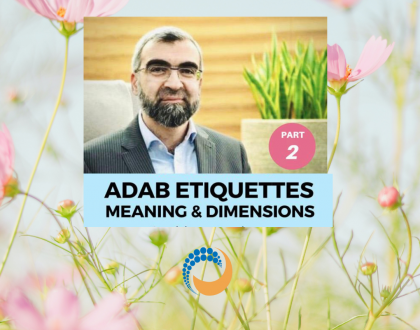Materialism vs Everlasting Reward

by Abu Shama
The Connection between Abstinence and Knowledge
Counter intuitively, instead of pursuing material gain, the best teachers of deen practice zuhud; abstaining from the quest for the perks of worldly life and possessing little of its luxuries. Ibn Abi’d-Dunya was told by some scholars:
‘The scholar should praise Allah for having deprived him of the luxuries of this life, in the same way that he should praise Him for what He has bestowed upon him. How can you compare the blessings and luxuries for which he will be accountable to the deprivation of luxuries which is a relief from being tested, and which keeps his mind free to worship and remember Allah? So he should give thanks to Allah for all of that.’
No-one is as careless as the person who has no interest in what Allah Almighty has prepared for His friends (awliya) in the Hereafter, that which no eye has ever seen nor ear has ever heard, and has never been imagined by any person.
Life of this world
The life of this world is short and its treasures are few compared to the Hereafter which is better and everlasting. The two rakah of sunnah of salatul Fajr is better than this world and all its content, then what is the fard salah worth?
This world does not have what it takes for reward or punishment for the people; if this world was good enough as a reward, Allah Almighty would have used it as a reward for the believer. And if this world offered enough punishment then Allah Almighty would have given it as punishment for the disbeliever. This world is neither worth being a reward for the believer or punishment for the disbeliever.
This world is not a fitting arena for Allah Almighty to give you everything, The Messenger of Allah (peace be on him) said:
‘If this world were worth the wing of a mosquito to Allah, He would not have given the disbelievers a drop of water to drink.’ [Ibn Majah]
We should realise that this world is not the yardstick of success. Today we see the disbelievers are the ones who have plentiful to drink and the believers are in many places living in destitution and without drinking water, we see that the disbeliever often lives a life of opulence while the believer is often precluded from worldly pleasures.
This very fact shows that the true value of this world and puts it in perspective exactly what this world is worth in the eyes of Allah. He wants to give you the Hereafter which is more befitting, a world that does not perish at the end of time but an eternal kingdom full of delights that no eyes have seen, no ears have heard and no human heart can comprehend.
The veil alone that the women in Paradise have on their heads is better than this world and everything in it. A piece of cloth is better than everything this world has to offer begs us to question what this world is really worth in comparison to Paradise. The Messenger of Allah (peace be on him) has left us a comparison between this world and the next, he said:
‘This world compared to the Hereafter is like dipping your finger in the sea and seeing how much water that will stick to it.’ [Mishkaat]
Therefore, being a Muslim who is spiritually healthy is better than achieving the kingdoms of Caesar since your religion is what will remain with you until you settle in the gardens of Paradise and this wealth is what will be left behind.
The last person to come out of the Fire of Hell will receive a Kingdom that is 10 times the size of the heavens and the earth, where the area that a whip occupies in Paradise is better than this world. This world compared to Paradise is like a drop of water in the sea, and the people are fighting and competing for this droplet of water which they will all leave behind.
Those who cling to this world have attached their hearts to it and are in love with it. The hardest thing for them is the loss of the world’s comfort and riches; they desire to enjoy this life alone.
Allah Almighty has created a place in Hereafter for you to live an eternal life with no death, a life of pride and ease with no humiliation, a life of security with no fear, a life of richness with no poverty, a life of joy with no pain, a life of perfection with no flaws. Allah is testing you in this world with a life that will end in death, a life of pride that is accompanied by humiliation and degradation, a life that is tainted by fear, where joy and ease are mixed with sorrow and pain. So many people are mistakenly seeking an easy life of power and pleasure in this world, they cling to this world with their molar teeth and have attached their hearts to it and are in love with it. The hardest thing for them is the loss of the world’s comfort and riches; they desire to enjoy this life alone but most of them never manage to achieve it, and those who do, enjoy it only for a brief time before it vanishes.
Once a man who admired a zahid (an ascetic) for his zuhud (renouncing worldly pleasure) and lack of interest in this world and said to him: ‘I have never seen a man who has as much zuhud as you do.’ The zahid told him, ‘Your zuhud is much stronger than mine, for my zuhud concerns this world, and this life is short and unstable, but your zuhud concerns the Hereafter, which is eternal.’
What is this world with all its treasures and allure really worth when the area covered by a whip is better than this world and all that is in it? Every Muslim should try to renounce and detach the dunya from their hearts and embody the quality of zuhud in their character. A hadith recalled by Ibn Majah states:
A man came to the Prophet (peace be on him) (peace be upon him) and said:
‘O Messenger of Allah, direct me to an act which, if I do it, will cause Allah to love me and people to love me.’
He said (peace be upon him) :
‘Renounce the world and Allah will love you, and renounce what people possess and people will love you.’ [Ibn Majah]
Renouncing the world is to forsake its adornments; it is to detach your hearts from the dunya. This frees your heart to love Allah and in return Allah will love you. Renouncing what people possess will lead them to love you because you are not competing with them. Competing in only material gains in the world destroys the Hereafter. However, you should compete and aspire with each other in righteous conduct as the Companions of the Prophet (peace be on him) did in order to encourage one another in pleasing Allah.
This hadith should not be taken to imply that you have to ignore the dunya as if it is worthless; rather it is teaching you to deal with the dunya with your hands but not to love it with your hearts. Therefore you deal with the dunya in the perfect way, trying and aspiring to be pioneers in your field for the benefit of humanity. The Prophet (peace be on him) said: ‘If you want to do something, do it in the perfect way’. Thus you seek for excellence [ihsan] and professionalism in your dealings.
Abstaining completely from the dunya is discouraged; it is not zuhud to live in the mountains and engage in the worship of Allah 24/7. This is selfish and cowardly behaviour. Referring to the hadith earlier, the one who is isolating himself is hoarding his knowledge, and knowledge does not vanish unless it is kept secret to oneself.
The Messenger of Allah (peace be on him) had the greatest knowledge and feared Allah the most; it is fair to say he had the greatest zuhud out of all the people. Yet we find that he lived amongst the people. It is more from the quality of zuhud to be with the people, to live with the people, to serve the people and deal with people than deal with oneself alone. Also being a zahid, does not mean one has to be reduced to tatty clothes and being a destitute. Islam promotes beauty, wherever there is beauty, there is truth and wherever there is truth, there is beauty. If Islam does not appear to you as beautiful then it is not Islam you are seeing. The Prophet (peace be on him) said:
‘God is beautiful and loves beauty and there fore anything that is not beautiful is not from God.’ [Muslim]
We should not reduce Islam to just outward appearance; clothes and looking destitute. Islam is not a poor man’s religion, for he who is blessed with the gift of faith; he has taken Allah as his Companion and Sustainer Who promises him a good life in this world and in the Hereafter. Allah says in the Qur’an regarding this:
Whoever works righteousness, whether male or female, while he is a true believer, verily to him We will give a good life [in this world with respect, contentment and lawful provision]. And We shall pay them certainly a reward in proportion to the best of what they used to do [i.e. Paradise in the Hereafter]. [an-Nahl: 16:97]
Allah does not look at the state and position of a person, but He looks at the state of the heart. Islam enriches the lives of the people who live by its code of conduct regardless of their worldly position. The Messenger of Allah (peace be on him) said
‘Richness do not come from abundance of wealth and possessions, but true richness is contentment of the soul’ [Bukhari]
Zuhud is therefore not a physical state or being in a remote place in isolation but rather a state of the heart. Many people believe that the blessing of the Hereafter cannot be attained without giving up the good things and pleasures of this world. So you see them punishing themselves and, making life hard for themselves with non-stop fasting and qiyam. Some of them even deny themselves good food, drink and clothing and reject work and marriage. All of this is wrong as Allah has created the good things of this world for the believers and He denounced those who forbid the beautiful things that Allah has created for His slaves:
Say: ‘Who has forbidden you to wear decent clothes or to eat the good food which Allah has provided for His servants?’ Say: ‘All these things are for the enjoyment of the believers in the life of this world though shared by others; but these shall be exclusively for the believers on the Day of Resurrection.’ [al-Araf:7:32]
This world is only condemned when it distracts the believer from the Hereafter, but if he treats it as a means of achieving success in the Hereafter, then its pleasures need not be spurned as some people may think. Uthman (may Allah be pleased with him) was amongst the wealthiest of Companions, he was indeed a zahid and was given the glad tiding of Paradise. The one who is totally abstaining from the world is neither getting this world nor will he get the Hereafter.
The teacher should not totally isolate himself, Junaid al-Baghdadi said:
‘Enduring isolation is easier than enduring the whims and flattery involved in mixing with other’
Therefore the teacher should keep himself available for the people, to seek advice, attend his circle, learn from him and ask of his opinion and gain wisdom from him.
Rabi’ah’ al-Adawiyya, a great zahida from the first century, her house use to be like a beehive, nonetheless, she was always in the presence of Allah her beloved, even when she was with the people. Rabi’ah used to recite these lines:
‘I have made You the companion of my heart.
But my body is available to those who desire its company,
And my body is friendly toward its guest,
But the Beloved of my heart is the guest of my soul.’
This is a series compiled following lectures on ‘The Manners and Etiquette of the Teacher and the Students’. The course was based on a book written by Shaykh al-Islam, Badr al-Din Ibn Jama’ah and conveyed to us by our Shaykh Haytham Tamim.
Qadi al-Qudat, Shaykh al-Islam, Badr al-Din Ibn Jama’ah was born in 639 AH (1241 AD). Originally from Syria and later moved to Egypt. He was educated at Hama, achieved excellence in religious studies and jurisprudence, and became a leading promoter of the Shafi’i Fiqh. Eventually, he attained the high status of Shaykh al-Islam and held the high position of Chief Justice. Imam al-Dhahabi has observed that Qadi Ibn Jama’ah was well versed both in prose and poetry, and had left abundant notes on Fiqh, Hadith, Usul al-Fiqh, and Tarikh(History). He commanded respect and influence, and had a large number of students and followers. He died at Cairo in the year 733 A.H. (1332 A.D.), aged 94, and was buried by the side of the great Imam Shafi’i.
His book on the subject of Adab al-Alim wal-Mutaalim
It was in the year 672 AH (1273 AD) that Ibn Jama’ah completed this book as a guide for both students and teachers to help improve quality of their academic life and work.
Suggested Books:
Ibn Jama’ah – Etitquettes of Seeking Knowledge
Abd Al Barr – Jami’ Bayan Al Ilm
Al Khateeb Al Baghdadi – Al Jami’ li Akhlaq Al Rawi
Recommended Posts

Can playing with children be an act of worship?
February 21, 2023

Whomsoever Allah wishes good for…
February 08, 2022


